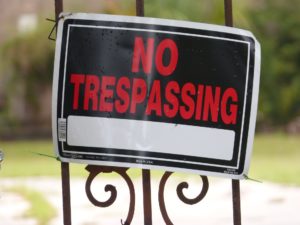You’re likely familiar with the term trespassing, but do you actually know what it means to trespass in New Jersey? This is a relatively serious offense that could possibly land you in jail depending on the circumstances. Thankfully, with an experienced New Jersey trespass defense attorney, you have a better chance at beating the charges.
What Is Classified As Trespassing?
In New Jersey, there are three classifications of trespassing.
Defiant Trespassing. This is a petty disorderly persons offense when a person is notified against trespassing but enters or remains in a place anyway. Notice may have been via the following methods:
- Actual communication
- Posting of a sign
- Fence or other enclosure
A guilty finding for defiant trespassing carries penalties of up to 30 days in jail and a $500 fine.
Unlicensed Entry of Structures. This is a more serious offense than defiant trespassing. A person commits this offense when he knows that he is not licensed or privileged to enter a research facility, structure, or separately secured or occupied portion thereof, but enters anyway or surreptitiously remains in place.
As a disorderly persons crime, this means up to six months in jail and a $1,000 fine. But it increases to a fourth degree crime when the trespassing was committed in certain locations (school property, chemical plant, etc.) and is punishable by up to 18 months in prison and $10,000 in fines.
Peering. You could be found guilty of peering when you look into a window or opening of a dwelling or structure adapted for overnight accommodation (hotel, RV, tent, etc.) for the purpose of invading the privacy of another when you know you’re not privileged to do so and a reasonable person would not expect to be observed. This is a fourth degree crime that carries penalties of up to 18 months in prison and $10,000 in fines.
When you have a knowledgeable New Jersey trespass defense attorney, he’ll tell you about any possible affirmative defenses that are available. These might include the following:
- The building was abandoned.
- The accused was in compliance with all lawful conditions because the building was open to the public at the time.
- The accused reasonably believed that the owner would have given permission to enter or remain on the premises.
In Need of a New Jersey Trespass Defense Attorney?
Don’t risk the possibility of being found guilty of criminal trespassing. If you’ve been charged with a trespass-related crime, contact Mark Catanzaro as soon as possible. He has over 30 years’ experience in defending his clients in all types of criminal matters.
Don’t wait, call today.
